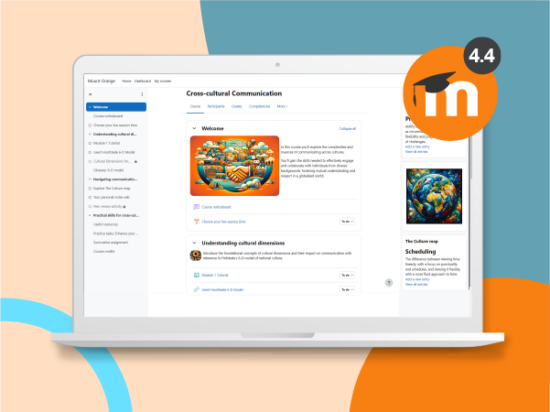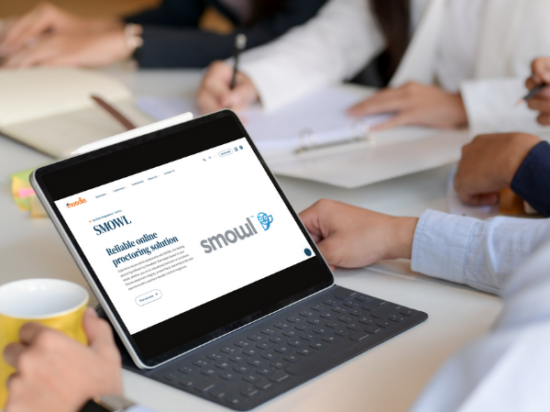When our CEO and Founder Martin Dougiamas launched Moodle in 2002, his vision was to provide educators with a way to create quality education experiences over the Internet, while freeing them from administrative tasks so that they could focus on what matters the most: creating great learning experiences.
With the global community of educators and developers in mind, Martin built Moodle as an open source platform that would follow the four open source freedoms. This way, developers, educators and organisations worldwide would be able to share knowledge, change and adapt the Moodle software to the way they needed it to work and contribute to improving Moodle for everyone.
20 years later and with hundreds of millions of users worldwide, Moodle LMS remains open source – and other open source projects like Moodle App and MoodleNet have joined the Moodle ecosystem. With a team of in-house developers and thanks to countless contributions from our growing global community, Moodle now helps empower educators in two thirds of Universities and thousands of organisations worldwide with open source technology.
Benefits of open source software
Besides the fact that we believe in the open source way and in making our technology accessible to everyone in order to enable quality education in all corners of the globe, there are many other reasons why Moodle LMS remains – and will always remain – open source:
Open source is the right choice for education
While no learning institutions are exactly alike and the approaches and methodology of educators vary, what educators do have in common is that they are active thinkers who like to share and collaborate with each other, and promote and engage in lifelong learning. Similarly, collaboration and creativity are also an inherent part of open source. Since its beginning almost 20 years ago, Moodle has been improved by the feedback and designs from tens of thousands of educators from all parts of the world. Their countless contributions help us innovate and evolve the Moodle platform in a constant process of improvement to meet the needs and challenges that educators face today.
Open source is long-lasting
As an open source platform, Moodle LMS has a large community that has grown around the project. At the heart of Moodle development is Moodle HQ, with teams of developers, designers and staff that focus on growing our open source software and coordinating the Moodle community of developers and users. The open source licenses guarantee that, even in the extremely unlikely case that Moodle HQ ever ceased to exist, Moodle LMS software could still be available and continue to be developed by the community.
Open source is reliable and secure
Moodle has over 1000 developers participating in the development of Moodle LMS, coordinated by the core teams at Moodle HQ. Because a sheer number of people are constantly monitoring the source code, any bugs are detected and fixed quickly through well-established processes, reducing the impact of vulnerabilities and security breaches.
Open Source allows organisations to control their own data
As an open source platform, Moodle LMS enables education institutions and organisations to have complete control over their data, including how and where they run their Moodle sites and store their data. They can choose whether they will use their own resources for hosting and support or obtain assistance from a Certified Moodle Service Provider. Unlike most proprietary software, open source software like Moodle means your choice of the product is separate from your choice of service provider.
Open source is flexible and customisable
A direct consequence of Moodle LMS’s code being publicly available is that any organisation or developer can extend or modify it into solutions that perfectly adapt to their needs, ranging from customising its look and feel to extensive integrations and new functionality. On top of that, Moodle has over 1800 plugins contributed by the community. Plugins are components that can be installed on the Moodle platform to add a specific feature, functionality or even appearance of a Moodle site.
This flexibility empowers users to build what they need and means that Moodle LMS is suitable for all kinds of learning organisations and situations: from international universities with thousands of students, to primary and elementary schools, students learning from a refugee camp with limited internet access, or government organisations training their public servants.
Thanks to its open source nature, Moodle LMS – the heart of the Moodle ecosystem – has constantly evolved through a commitment to pedagogy and a collaborative global community of like-minded educators and technologists. Trusted by hundreds of millions of learners worldwide, Moodle has grown to become the world’s most customisable and trusted open source learning management system. Moodle will always remain committed to public code, the open source project and open source values.
There are three ways to get your hands on Moodle LMS:
- You can download it with the freedom to install, build and customise it on your own server.
- If you want to get a Moodle site for trial right away or an off-the-shelf application for smaller, simpler projects, you can sign up to MoodleCloud.
- For larger projects and better success, we recommend talking to a Moodle Certified Service Provider, who will help you create the right LMS for your organisation.



